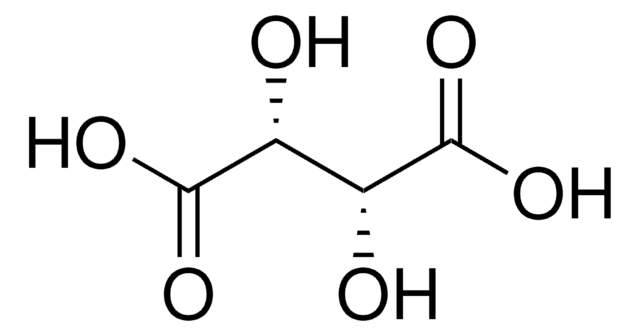PHR1472
Tartaric Acid
Pharmaceutical Secondary Standard; Certified Reference Material
Synonym(s):
L-(+)-Tartaric acid, (2R,3R)-(+)-Tartaric acid, L-Threaric acid
About This Item
Recommended Products
grade
certified reference material
pharmaceutical secondary standard
Quality Level
Agency
traceable to USP 1643340
vapor density
5.18 (vs air)
API family
tartaric acid
CofA
current certificate can be downloaded
autoignition temp.
797 °F
packaging
pkg of 1 g
technique(s)
HPLC: suitable
gas chromatography (GC): suitable
mp
170-172 °C (lit.)
application(s)
pharmaceutical (small molecule)
format
neat
storage temp.
2-30°C
SMILES string
O[C@H]([C@@H](O)C(O)=O)C(O)=O
InChI
1S/C4H6O6/c5-1(3(7)8)2(6)4(9)10/h1-2,5-6H,(H,7,8)(H,9,10)/t1-,2-/m1/s1
InChI key
FEWJPZIEWOKRBE-JCYAYHJZSA-N
Looking for similar products? Visit Product Comparison Guide
General description
Application
Analysis Note
Other Notes
Footnote
Recommended products
related product
Signal Word
Danger
Hazard Statements
Precautionary Statements
Hazard Classifications
Eye Dam. 1
Storage Class Code
11 - Combustible Solids
WGK
WGK 1
Flash Point(F)
Not applicable
Flash Point(C)
Not applicable
Regulatory Listings
Regulatory Listings are mainly provided for chemical products. Only limited information can be provided here for non-chemical products. No entry means none of the components are listed. It is the user’s obligation to ensure the safe and legal use of the product.
JAN Code
PHR1472-1G-PW:
PHR1472-1G:
Choose from one of the most recent versions:
Certificates of Analysis (COA)
It looks like we've run into a problem, but you can still download Certificates of Analysis from our Documents section.
If you need assistance, please contact Customer Support.
Already Own This Product?
Find documentation for the products that you have recently purchased in the Document Library.
Customers Also Viewed
Protocols
Separation of Pyruvic acid, United States Pharmacopeia (USP) Reference Standard; Tartaric acid, United States Pharmacopeia (USP) Reference Standard; Citric acid, United States Pharmacopeia (USP) Reference Standard; Malic acid, United States Pharmacopeia (USP) Reference Standard; L-Pyroglutamic acid, ≥99.0% (T); Lactic acid, United States Pharmacopeia (USP) Reference Standard; Acetic acid, ≥99.99% trace metals basis; Succinic acid, United States Pharmacopeia (USP) Reference Standard
Our team of scientists has experience in all areas of research including Life Science, Material Science, Chemical Synthesis, Chromatography, Analytical and many others.
Contact Technical Service







